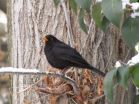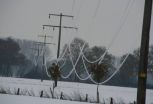(Press-News.org) Boulder, CO, USA – Understanding Earth's paleo-hurricane record cannot be more timely and important in a light of Hurricane Sandy, which shocked the U.S. East Coast last week. Talks in this Wednesday afternoon session at the GSA Annual Meeting in Charlotte, North Carolina, integrate field, lab, and model analysis of past hurricanes and future scenarios, covering a wide range of temporal and spatial scales.
Session co-organizer Daria Nikitina of West Chester University says that "gaining understanding of past events provides the context for future coastal vulnerability. Given predicted global warming, the frequency and magnitude of severe weather events will probably increase and with it the likelihood of more coastal devastation" like that witnessed in New Jersey, New York, and Connecticut last week, as well as associated weather events further inland.
Presenter Scott P. Hippensteel of the University of North Carolina at Charlotte will talk on "The effectiveness of traditional paleotempestology proxies in backbarrier marshes from the Southeastern Atlantic Coast" at 2:55 p.m. Writing for the Geological Society of America's science and news magazine, GSA Today, in 2010, he notes, "Growing populations and recent hurricane activity along the Atlantic and Gulf coastlines have made clear the need for a more accurate and extensive record of storm activity" (GSA Today, v. 20, no. 4, p. 52). He also writes that "the field of paleotempestology has never been of more importance," especially "in the current period of climate change" (GSA Today, p. 53).
As early as 2001, presenter Jeffrey P. Donnelly of Woods Hole Oceanographic Institution addressed "Sedimentary evidence of intense hurricane strikes from New Jersey" (Geology, v. 29, no. 7, p. 615). In the article, he warns, "Intense storms present a significant threat to lives and resources and can result in significant alteration of coastal environments." He discusses, "The most famous storm affecting the New Jersey shore in the twentieth century was the Ash Wednesday northeaster of March 5, 1962… Storm surge associated with this storm overtopped many of the barrier islands of the New Jersey coast and deposited overwash fans across backbarrier marshes there." In Wednesday's session, Donnelly will speak about "Late Holocene North Atlantic hurricane activity" at 1:35 p.m.
Michael E. Mann of The Pennsylvania State University, who spoke earlier this week in a late-breaking panel on Hurricane Sandy, will deliver a talk on "Relationships between basin-wide and landfalling Atlantic tropical cyclones: Comparing long-term simulations with paleoevidence" at 3:40 p.m. on Wednesday.
Heading the session with Nikitina are Andrea D. Hawkes of the University of North Carolina Wilmington and Jon Woodruff of the University of Massachusetts Amherst. Hawkes is a co-author on the Donnelly talk; Woodruff is a co-author on a talk presented by Christine M. Brandon, also at U-Mass-Amherst, "Constraining hurricane wind speed at landfall using storm surge overwash deposits from a sinkhole in St. Marks, FL."
GSA's Quaternary Geology and Geomorphology Division and International Section cosponsor this session, along with the International Geoscience Programme (IGCP) 588: Preparing for Coastal Change.
WHAT: Session 266: T118. Paleotempestology: Proxy Record Development and Climate Forcing Mechanisms
When: Wednesday, 7 Nov., 1:30 p.m. to 5:30 p.m.
Where: Charlotte Convention Center, Room 219AB
Online at https://gsa.confex.com/gsa/2012AM/webprogram/Session30744.html
INFORMATION:
Find out what else is new and newsworthy by browsing the complete technical program schedule at https://gsa.confex.com/gsa/2012AM/finalprogram/. To identify presentations in specific areas of interest, search topical sessions by discipline categories or sponsors using the drop-down menus at www.geosociety.org/meetings/2012/sessions/topical.asp, or use your browser's "find" feature to search for keywords or convener names.
Representatives of the media and public information officers from universities, government agencies, and research institutions, may participate in technical sessions, field trips, and other special events. Eligible media personnel will receive complimentary registration and are invited to use GSA's newsroom facilities while at the meeting. Journalists and PIOs must pay for any short courses or field trips in which they wish to participate.
For information on media eligibility, go to www.geosociety.org/meetings/2012/media.htm. Media personnel may register onsite in the GSA Newsroom (room 204) at the Charlotte Convention Center. Wireless Internet access and a quiet space for interviews will be provided in the newsroom, along with beverages and light snacks throughout the day.
Newsroom Hours of Operation
Tuesday, 6 Nov., 7:30 a.m. to 6 p.m.
Wednesday, 7 Nov., 7:30 a.m. to 5:30 p.m.
Newsroom telephone number (incoming calls): +1-704-339-6207
Contact Christa Stratton, GSA Director of Communications & Marketing, for additional information and assistance.
www.geosociety.org/meetings/2012/
What paleotempestology tells scientists about today's tempests
GSA Annual Meeting & Exposition: Technical Session, Wednesday, Nov. 7
2012-11-07
ELSE PRESS RELEASES FROM THIS DATE:
New insight into why haste makes waste
2012-11-07
Why do our brains make more mistakes when we act quickly?
A new study demonstrates how the brain follows Ben Franklin's famous dictum, "Take time for all things: great haste makes great waste."
The research – conducted by Research Assistant Professor Richard Heitz and Jeffrey Schall, Ingram Professor of Neuroscience, at Vanderbilt University – has found that the brain actually switches into a special mode when pushed to make rapid decisions.
The study was published Nov. 7 in the journal Neuron.
"This is a question that is very basic to our experience as human beings, ...
Teaching the blind to read and recognize objects with sounds
2012-11-07
VIDEO:
This is an example of one image from each of the visual categories used in the structured SSD training (geometric shapes, Hebrew letters, textures, body postures, everyday objects, houses, and...
Click here for more information.
Areas of the brain in blind people can learn to process visual input through the use of sound, even after years or perhaps even lifelong blindness, according to new research reported in the November issue of the Cell Press journal Neuron. The findings ...
Looking for the anti-Alzheimer's molecule -- A new approach to treating a devastating disease
2012-11-07
Ottawa, Canada (November 7, 2012) – Researchers at Dalhousie University have discovered a new technique using "computer-aided" drug design that may lead to an entirely new approach in the treatment of Alzheimer's disease (AD).
"Alzheimer's is a devastating disease for which no truly disease-modifying drugs are available. Our approach is completely novel. We explore how the human body attempts to protect itself from Alzheimer's, and then we exploit this to develop an entirely new approach to therapeutics," explained Dr. Weaver, a professor at Dalhousie University, ...
Geologist calls for advances in restoration sedimentology
2012-11-07
BLOOMINGTON, Ind. -- Rapid advances in the new and developing field of restoration sedimentology will be needed to protect the world's river deltas from an array of threats, Indiana University Bloomington geologist Douglas A. Edmonds writes in the journal Nature Geoscience.
The commentary, published this week in the November issue, addresses the fact that land is disappearing from river deltas at alarming rates. And deltas are extraordinarily important: They are ecologically rich and productive, and they are home to about 10 percent of the world's population.
"There's ...
In the digital age, managers can't ignore #angrycustomers
2012-11-07
CHESTNUT HILL, MA (November 7, 2012) – In a digital age where dissatisfied consumers vent their concerns through biting viral videos, nasty blog posts or negative online comments, managers need to develop strategies to soothe angry customers in person as well as online, according to a new study in the latest edition of the Journal of Service Research.
In a study that explores the changing ways in which customers express their emotions, the researchers found that anger can quickly fuel negative word-of-mouth commentary to fellow consumers, family and friends, as well as ...
Protein reveals diabetes risk many years in advance
2012-11-07
When a patient is diagnosed with type 2 diabetes, the disease has usually already progressed over several years and damage to areas such as blood vessels and eyes has already taken place. To find a test that indicates who is at risk at an early stage would be valuable, as it would enable preventive treatment to be put in place.
Researchers at Lund University have now identified a promising candidate for a test of this kind. The findings have been published in the journal Cell Metabolism.
"We have shown that individuals who have above-average levels of a protein called ...
Persistent sync for neurons
2012-11-07
A team of Brazilian physicists working with neuroscientists studying freely behaving rats have found that their neurons often act in precise coordination over time, in a study about to be published in EPJ B. These findings stem from the work of Bruno Silva, a researcher at Bahia Federal University in Salvador, and his colleagues from other universities in the Northeastern region of Brazil, and suggest that neuronal networks' memory could be explored in the future.
Because neurons are connected with each other, acting as operational units in the brain, they can be considered ...
City birds adapt to their new predators
2012-11-07
Faced with the same threat, city and country birds do not react in the same way despite being from the same species. According to a new study, urban birds have changed their anti-predator behaviour in new environments.
When a bird is faced with a predator, its only objective is to escape. However, city birds do not react in the same way as their countryside counterparts, despite being from the same species. Urbanisation plays an influential role in their survival strategies.
To study this phenomenon, Juan Diego Ibáñez-Álamo, researcher at the University of Granada ...
Ultrasensitive photon hunter
2012-11-07
Fast and ultrasensitive optical systems are gaining increasing significance and are being used in a diverse range of applications, for example, in imaging procedures in the fields of medicine and biology, in astronomy and in safety engineering for the automotive industry. Frequently the challenge lies in being able to record high-quality images under extremely low light conditions. Modern photo detectors for image capture typically reach their limits here. They frequently work with light-sensitive electronic components that are based on CMOS (Complementary Metal Oxide ...
Dealing with power outages more efficiently
2012-11-07
Power supply is the backbone of our modern economy. Nearly every aspect of life depends on electrically-operated devices. When the flow of power stops, it is not just the lights that go out. In the supermarket, the automatic teller machines and cash registers stop working. Even telephones, radios and televisions become paralyzed. If the shortage lasts a long time the supply of hot water, gas and fuel and the functioning of respirators at intensive care units in nursing homes or at private homes is at risk.
The causes of this dreadful scenario can range from natural disasters ...
LAST 30 PRESS RELEASES:
Blood test “clocks” predict when Alzheimer’s symptoms will start
Second pregnancy uniquely alters the female brain
Study shows low-field MRI is feasible for breast screening
Nanodevice produces continuous electricity from evaporation
Call me invasive: New evidence confirms the status of the giant Asian mantis in Europe
Scientists discover a key mechanism regulating how oxytocin is released in the mouse brain
Public and patient involvement in research is a balancing act of power
Scientists discover “bacterial constipation,” a new disease caused by gut-drying bacteria
DGIST identifies “magic blueprint” for converting carbon dioxide into resources through atom-level catalyst design
COVID-19 vaccination during pregnancy may help prevent preeclampsia
Menopausal hormone therapy not linked to increased risk of death
Chronic shortage of family doctors in England, reveals BMJ analysis
Booster jabs reduce the risks of COVID-19 deaths, study finds
Screening increases survival rate for stage IV breast cancer by 60%
ACC announces inaugural fellow for the Thad and Gerry Waites Rural Cardiovascular Research Fellowship
University of Oklahoma researchers develop durable hybrid materials for faster radiation detection
Medicaid disenrollment spikes at age 19, study finds
Turning agricultural waste into advanced materials: Review highlights how torrefaction could power a sustainable carbon future
New study warns emerging pollutants in livestock and aquaculture waste may threaten ecosystems and public health
Integrated rice–aquatic farming systems may hold the key to smarter nitrogen use and lower agricultural emissions
Hope for global banana farming in genetic discovery
Mirror image pheromones help beetles swipe right
Prenatal lead exposure related to worse cognitive function in adults
Research alert: Understanding substance use across the full spectrum of sexual identity
Pekingese, Shih Tzu and Staffordshire Bull Terrier among twelve dog breeds at risk of serious breathing condition
Selected dog breeds with most breathing trouble identified in new study
Interplay of class and gender may influence social judgments differently between cultures
Pollen counts can be predicted by machine learning models using meteorological data with more than 80% accuracy even a week ahead, for both grass and birch tree pollen, which could be key in effective
Rewriting our understanding of early hominin dispersal to Eurasia
Rising simultaneous wildfire risk compromises international firefighting efforts
[Press-News.org] What paleotempestology tells scientists about today's tempestsGSA Annual Meeting & Exposition: Technical Session, Wednesday, Nov. 7




